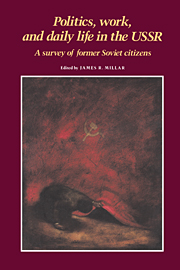Book contents
- Frontmatter
- Contents
- Foreword
- List of contributors
- PART I INTRODUCTION
- PART II POLITICS: SOURCES OF REGIME SUPPORT
- PART III WORK: ECONOMIC/DEMOGRAPHIC TRENDS
- PART IV LIFE: SOCIAL STATUS, ETHNIC RELATIONS, AND MOBILIZED PARTICIPATION
- Appendix A The SIP General Survey sample
- Appendix B Response effects in SIP's General Survey of Soviet emigrants
- Glossary
- General bibliography of Soviet Interview Project publications
- Index
Foreword
Published online by Cambridge University Press: 21 March 2010
- Frontmatter
- Contents
- Foreword
- List of contributors
- PART I INTRODUCTION
- PART II POLITICS: SOURCES OF REGIME SUPPORT
- PART III WORK: ECONOMIC/DEMOGRAPHIC TRENDS
- PART IV LIFE: SOCIAL STATUS, ETHNIC RELATIONS, AND MOBILIZED PARTICIPATION
- Appendix A The SIP General Survey sample
- Appendix B Response effects in SIP's General Survey of Soviet emigrants
- Glossary
- General bibliography of Soviet Interview Project publications
- Index
Summary
American scholarship on the USSR expanded rapidly after World War II. The critical obstacle to research at the time was the paucity of data, particularly reliable data, on Soviet society. The publication of a national statistical abstract had been discontinued in the midthirties, and the last full population census dated back to 1926. Few foreigners were admitted to the country for purposes of observation, study, or research. Under those circumstances the several million former Soviet citizens living in the West were an invaluable source of information about the society that they had left during the turbulence of the war. They provided the raw data gathered by the Harvard Refugee Interview Project, which produced a set of publications that greatly enriched Western understanding of Soviet society in those years.
The volume of data available on Soviet society today is vastly greater than in those lean years. In 1956 the publication of an annual statistical abstract resumed, and three decennial population censuses have been published since then. Hundreds of foreign students and scholars have lived and worked in Soviet universities, institutes, libraries, and archives under various cultural and scientific exchange programs. Journalists and businessmen have established relationships that have enabled them to penetrate fairly intimately into parts of the society. A large volume of social and economic research by Soviet scholars on Soviet society is available in the West, as are the unofficial research and data published as samizdat.
- Type
- Chapter
- Information
- Politics, Work, and Daily Life in the USSRA Survey of Former Soviet Citizens, pp. vii - xiiPublisher: Cambridge University PressPrint publication year: 1987

